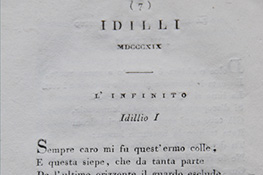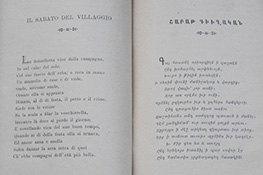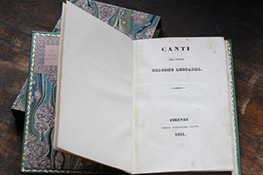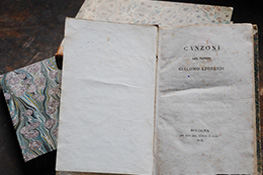Versione italiana English version Version française Versión en español
The Historical Library preserves inside the Parenti Fund, precious coffer of bibliographic rarities, some of the first editions of the great Italian writers from the 1800s such Foscolo, Manzoni and Leopardi.
Of the poet from Recanati there is the first edition of the Canzoni, printed in Bologna by Nobili e Comp. in 1824, and the first edition of the Versi, also published in Bologna by Stamperia delle Muse, in 1826. Leopardi lived in Bologna in 1825, and there he met count Carlo Pepoli, recipient of the note from Epistola, included, with the Idilli, in the 1826 edition. The first edition of Operette Morali came the next year, published in Milan by the editor Stella, and includes the twenty proses written until 1824.
Between 1825 and 1833 Leopardi traveled to Bologna, Pisa, Recanati and Florence, where he stayed longer, and where the editor Piatti published the first edition of Canti in 1831, dedicated to his Tuscany friends, including the Canzoni and the small and great Idilli, with the Epistola to the count Carlo Pepoli. In Florence the poet met the noblewoman Fanny Targioni Tozzetti, the "learned allure" of the Aspasia cycle, and the writer and patriot from Naples Antonio Ranieri, who became his great friend and was the cause of the poet's transfer to Naples in 1833.
In Naples in fact were last published the Leopardian Operas with the poet being still alive, "corrected, enlarged and the only one approved by the author", published in 1835 by the editor Starita. It should be composed by many volumes, but the Bourbon censorship seized the opera more than once, so that only few copies containing all the Canti (included the Aspasia cycle and the Canti Sepolcrali) and the first thirteen Operette Morali could circulate. Of course this edition were not allowed to include La Ginestra nor Il tramonto della Luna, composed in 1836 in Torre del Greco. This last two Leopardian compositions where published after the death of the author, with the complete edition cured by Antonio Ranieri for the editor Le Monnier of Florence, in 1845 (absent in the Parenti Fund). Between the curiosities there is an Armenian translation of some chosen Leopardian Canti, made by father Arsenio Ghazikian (1870-1932), mechitherist religious of the San Lazzaro degli Armeni monastery of Venice. These chosen poems, published with original front text (Venice 1898), include the song All'Italia, the Canto notturno di un pastore errante dell'Asia, Il Sabato del Villaggio, il Passero Solitario, Nelle nozze della sorella Paolina, Le ricordanze, and La vita solitaria. Almost a dialogue with the poet who, during years of crazy and desperate study, read and translated some Armenian texts, even though with the help of the latin versions.




